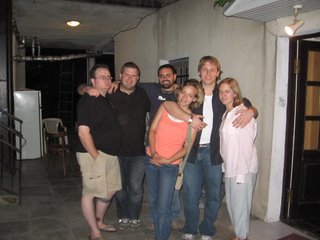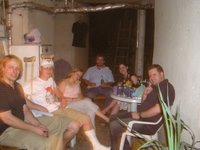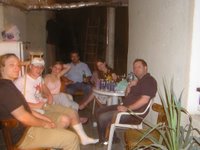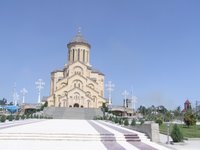
Genora's "Guesthouse Nika" became my home-away-from-home in Tbilisi. The neighborhood was fairly typical for the city, but what we might call "transitional" over here. Grimy Soviet-style flats, sleek new high-rise apartments and overgrown, tumbledown lots made for an odd mix. Then there were the older homes, like Genora's, built prior to the Communist-era apartments. They were all 2-story, either brick or stuccoed, and were built flush with the sidewalk. As is typical in the east, whether Christian or Muslim, little is revealed streetside. The life of the family and the beauty of the home is always hidden in the courtyard behind the gate. Such was the case with Genora's home. The gate opened onto a small, pleasant courtyard with daylillies in bloom in one corner, and a grape arbor providing shade. A passageway led to a rear courtyard, which appeared overgrown at first glance. Actually, the family utilized the small area to its limit, but also with an eye for beauty, as apple, fig and pomegranate trees, grape arbors, roses and daylillies all vied for space.

This was the home of Genora's parents, and she had always lived here. Her father, an engineer, had built the house decades ago. Genora graduated from the university, trained as a classical pianist. In Soviet days, Georgia was perhaps the most affluent of the old republics, enjoying a relatively high standard of living. That all changed upon the fall of Communism and the regaining of independence. The market for Georgia's goods suddenly dried up. The security offered by the state was gone. And few had any real concept of what we call "business." Genora taught piano lessons (and still does at a local school), but this was not enough to survive. The family silver had to be sold, and then her piano. She said she was not going to sit around and wait for the government to provide for her. so, for the last 7 years she has operated a a pension in her home. While perhaps wistful for their former standard of living, she is not bitter and does not want to go back. She smiles, shrugs and says, "And so we live."
Genora's guesthouse is the unofficial headquarters for Peace Corps volunteers in Georgia, Armenia and Azerbaijan. The PC's office in nearby, and whenever the volunteers come into the city from their various postings, either on break, to take care of bookkeeping or to pick up their mail, they always stay at Genora's. It's a good arrangement on both sides--she speaks of them as "her children" and they view her house as a home-away-from-home.
I suppose my son and I--mere travelers and not connected with the PC--were something of oddity to the volunteers. No matter, they pulled us right in to their fellowship. I have never met a friendlier bunch of people, all eager to talk. And I might add, that I have rarely felt better about my own country that I did with these young people. Two years in a remote Georgian village is rarely seen as a savvy career move. And yet here they were. Graduate school and careers could wait. Right now, they were just trying to make a difference.

A covered patio connected the two courtyards. A cheap plastic table and chairs, coupled with an old refrigerator wedged in on the opposite wall made for a perfect hangout. I will never forget our first full night there. The two of us, and anywhere from 6 to 9 of our new PC friends, sat around shooting the bull, drinking Kazbegi beer and smoking too many cigarettes until 4:30 in the morning. One of the young men commented on my staying up with them. I told him I was delusional. He asked what I meant and I told him that I thought I was still young. He said he hoped he could be delusional one day. The next night, however, I was somewhat less delusional and had to give it up at 3:00 AM.
Anyway, these wide-ranging discussions touched on a number of subjects. I found their insight into the country invaluable, as they were eager to talk about Georgia and Georgians. I remember one anecodote,in particular. It seems in the old Soviet days, the other "republics" would simply do as Moscow dictated. The Georgians, however, would simply shrug, ask, "why?" and then go about doing as they wanted. I certainly saw evidence of this in my travels. But then Georgia has always been a dangerous neighborhood--a small country wedged between powerful ones. This attitude has less to do with obstinacy than it does with the preservation of Georgian culture in the face of a long history of invasions.

I have always been a little amused that when people sit around and drink, the subject of religion will often come into the conversation. We were no exception. First of all, I had an immediate connection with one of the older young men. He was out of the Peace Corps, but remained in Georgia, working for another humanitarian organization. He was from Texas and he had belonged to the same heritage church as mine. He was currently engaged to a Georgian Orthodox girl. And while he had left his old church far behind, he was not yet ready to cross the Bosphorus as I had. I believe he wanted to, but was looking for a narrower place to cross. He would go with her to the Orthodox Church, but was put off by some of the claims Orthodoxy makes for itself. She would accompany him to a "nondenominational" Bible study, but would become angry over their evangelical condescension--the idea that they were bringing "the gospel" to a country that, in fact, has a rich, 1700 year old Christian history. Anyway, in coming months, they are to have a Georgian wedding with a priest, and then a few months later, a Texas ceremony for his family. He and I shared a laugh over his mother's concern--whether the girl could be rebaptized and whether or not she could be "saved." Lord have mercy!

They were all intrigued when they discovered that I was Orthodox, which of course led the discussion into new areas. Many of these intelligent young people had been in Georgia for 2 years, working daily as members of Georgia society. It would be the heighth of presumption for me to lecture them about Georgians; for me to conclude that I had better insight into the culture after only a brief stay than they did. And yet, except for the one young man, I believe many of them had missed a key element of Georgian society. They were overlooking, or rather, dismissing the church. Partly this is due to the fact that they were Americans. We are still probably the most religiously observant folks around, statistically, but like the old saying goes, our American popular religion is 3,000 miles wide and 2 inches deep. Many, many Americans have only a superficial interest and/or understanding of matters of faith--of whatever stripe. And like our European kinsmen, it is becoming increasingly irrelevant to our society as a whole. Trained to help developing countries move into the modern world, I suspect that they failed to consider that a country's faith could/would/does continue to define the culture. For example, I had to explain to one of the young men from New England what I meant by the word "evangelical." He wasn't being obtuse, he actually didn't know.
I was assured that "Georgians didn't really go to church;" the impression being that they did not take it all that seriously. One young man related his experience at an Orthodox church. He observed that "the priest didn't even face the congregation. He has his back to them the whole time. It was like he was doing his own thing and wasn't even aware that the congregation was even there." Also, he saw a young man talking on his cell phone during the service. Oh, dear. Where to begin? I wondered how one could be trained for work in a traditional Orthodox country and not learn the bare rudiments of how they worship? How could one live there for 2 years and not pick up on this?
I quickly gathered that the problem was with their perception of "church." Broadly speaking, in America, church is a place where you fill up the parking lot on Sunday, go in and settle in to a comfortable pew, hear some nice uplifting songs and listen to an upbeat, feel-good sermon from the pastor and then go out to eat. And even if you are not a regular church-goer, you know that is what happens when Americans "go to church." Unknowingly, this was the prism through which they viewed Georgian religiosity. With this perception of "church," no wonder they dismissed Georgian spirituality. This is a shame, for in so doing, they missed a key, if not the very key, to understanding this people.

I began by addressing the experience of the one young man in the Orthodox church. I told him that, by and large, he was exactly right--the priest was not talking to the congregation. He was talking to God. I tried to explain how it differed from American Protestantism; how the "sermon" was not the thing at all; that an Orthodox church was not a place to go and hear a nice lesson. It was a temple; a place to pray; a place to experience God. Worshippers in an Orthodox church are not an audience, they are participants. I couldn't excuse the cell-phone guy, as Georgians seem more enamored with them than even we are, but I did try to convey that the Orthodox have a different conception of "church."
Admittedly, I am hardly an unbiased observer. Yet, over the course of my stay in Georgia, I suppose I was in at least 15 churches--from a mere 4 years old to 1500 years old--and found myself encouraged and edified by what I saw. Georgian churches are far from the museum pieces of western Europe. You might even say some literally churn with activity. As expected, people were coming in an out, lighting candles and praying before the icons. Yet they were not just the faithful old, the bow-legged old peasant women, as some mught presume. In fact, the demographics I saw tended towards the young, both women and men. The sight of young men, even soldiers, praying and crossing themselves before the icons is a healthy thing. For Orthodoxy is still a manly religion. At Sioni Cathedral I chanced upon a priest striding across the courtyard to the church. He was singing--bellowing actually--in a rich, strong bass. Yes, there's still plenty of room for men in Orthodoxy.
The spectacular new Sameba Cathedral dominates the Tbilisi skyline, billed as the third largest Orthodox church in the world. My PC friends told me that the building of this church generated some local controversy. Eyebrows were raised at such a lavish building in a struggling country. Others worried that it was erected largely from contributions of a businessman with questionable connections. Then part of the courtyard supposedly covered an old Armenian cemetery. So much for the naysayers. I found it magnificent and full of worshippers. I also witnessed 2 baptisms and 1 wedding in the short time I was there.
Taxi drivers in Tbilisi habitually cross themselves 3 times whenever they pass in sight of a church. Pedestrians stop on the pavement and do the same thing. Icon stores dot the city. New chapels and churches can be seen on the highway from Tbilisi to the coast--all in the beautiful Georgian style. Even in the bleak apartment flats of decaying Rustavi, chapels have been constructed next to the playgrounds in the common areas.
My PC friends complain that the Orthodox Church has been slow to build churches where the people are located. For example, my friend's fiancee lives in a neighborhood of 50,000 people, that until very recently, had no church. Perhaps this is true. But then convenience has never been a watchword in Orthodoxy. Georgians are much more likely to build a church on a rocky cragg overlooking all of God's creation than they are to erect it down on the crossroads.
I have to conclude that Orthodoxy in Georgia is vibrant, perhaps even resurgent. 80% of the populace identify themselves as Orthodox. Admittedly, some of this allegiance may be tilted more to their nationalistic identity as Georgians. But after 70 years of Communism, the re-emergence of Orthodox Christianity seems fresh and alive and invigorating.
4 comments:
Gee, I don't check on your blog for a couple days and WOW... VERY cool stuff. The next time you go, let's go together! Awesome...
s-p---start saving up your frequent-flyer miles and we'll do it! Now, knowing what know about me, are you sure you want to????? Ha!
Wow, great thoughts.
When I was in college, we saw a Russian film that was dealing with Stalin that ended with the most powerful statement, an old woman in Georgia said "if a road doesn't lead to a church, what is the point" or some version therein. It was an extremely powerful moment in the film for me, and what I am reminded of in this post.
Mimi--thanks for the wonderful quote. Wish I had known it before I went!
Post a Comment